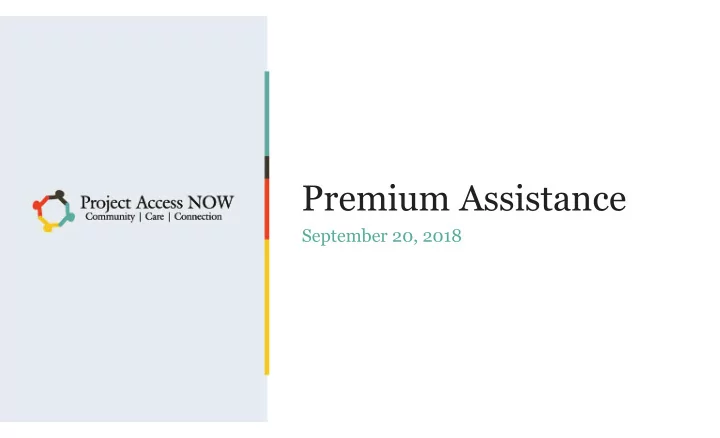

Premium Assistance September 20, 2018
Project Access NOW & Premium Assistance • Project Access NOW • Started in 2007 • Health based non-profit with multiple programs • Ensuring access to care, services, and resources for those most in need • Premium Assistance Financial assistance program • Started in January 2014 • • Project Access NOW and Oregon Health Leadership Council • Funded by Hospital Systems Network • Kaiser Permanente, Providence Health and Services, Adventist Health, Tuality Healthcare, Legacy Health, OHSU Part of Outreach, Enrollment and Access program • • Serves low-income Portland Metro tri-county residents
Program Benefits • Monthly premium payment • Reduced out-of-pocket costs* • Pharmacy co-pay assistance • Navigation of health care and Marketplace
Eligibility Requirements • Under 300% FPL • Resident of Clackamas, Multnomah, or Washington County • Enrolled in Qualified Health Plan (QHP) through Marketplace • Silver-level with Kaiser, Moda, PacificSource, or Providence • Eligible for tax credit Not eligible for other “affordable” qualified health insurance • • Use full tax credit
Pros and Cons • Not an overhaul of the current system • Filling in the cracks • Helps clients who would otherwise not have access to affordable coverage • Does not address systemic barriers • Eliminates some, but not all, barriers to using coverage • State-based Marketplace
Capitalizing on Existing Resources • Tax credits (APTCs) and cost-sharing reductions (CSRs) • Hospital Charity Care & Community Benefit Hospital Systems Network funding • • Bill write-offs • Relationships with insurance carriers • Referrals from community partners
Current Challenges • Relationships with insurance carriers • Processes for third-party payments • Single contact at insurance carrier billing offices • Helping clients understand and utilize their insurance and PA • Providers’ differing policies • Client navigation and follow up • Rate changes • Changes in eligibility and transitioning clients Ineligible populations • • Tax credit reconciliation
Potential Challenges • Funding • Hospital and provider policies • Processes for third-party payments • Enrollment assisters and outreach in local areas • Client navigation and follow up • Establishing relationships with insurance carriers and providers • Plan availability in rural areas • Barriers to care High-risk clients •
Similar Programs • COFA Premium Assistance • Health Insurance Premium Program - American Kidney Fund • Ryan White HIV/AIDS Program
Recommend
More recommend